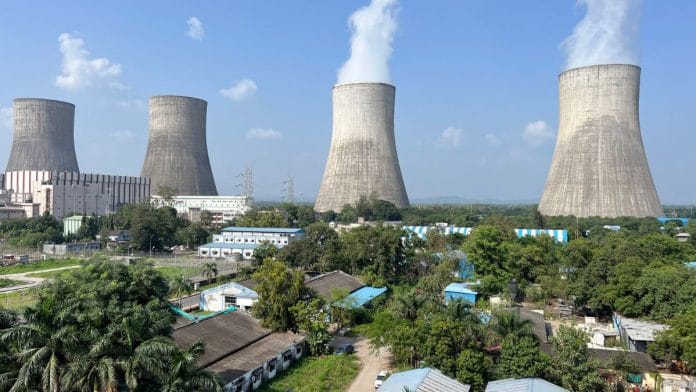New Delhi: The Centre will be pushing amendments to one of India’s key nuclear laws—the Atomic Energy Act, 1962—in the upcoming winter session of Parliament which will pave the way for private companies to participate in the civil nuclear sector.
The Centre has listed the Atomic Energy Bill 2025 in the Lok Sabha bulletin for the winter session which will start 1 December. Amendments to another key nuclear law, the Civil Liability for Nuclear Damage Act (CLNDA), 2010, are also in the pipeline, but they are unlikely to come up this winter session.
This comes 10 months after Union Finance Minister Nirmala Sitharaman had announced in her Union Budget that the government will take up amendments to the two laws.
Once they come through, these amendments will be a big reform at a time when India has set a target of generating at least 100 GW nuclear energy by 2047. Power sector experts have been lamenting for a while now that unless private players come in, it will be difficult for India to meet the ambitious target through just state-owned and controlled entities.
The Atomic Energy Act prohibits the participation of the private sector or even state governments. Under this law, the power to operate nuclear power plants is vested in the central government and companies or corporations established by it. CLDNA on the other hand provides the legal framework for compensation to victims of a nuclear incident.
The Nuclear Power Corporation of India Limited (NPCIL), a PSU under the Department of Atomic Energy, is the only entity operating nuclear power plants at present. It currently operates all 24 commercial nuclear power reactors in the country.
Suppliers of equipment and potential operators including companies like US based Westinghouse Electric are also apprehensive about some of the provisions of the CLNDA, which has led to foreign companies staying away, contributing to the slow pace of development of nuclear energy.
India’s nuclear power capacity currently is merely 8,180 MW, which is just two percent of the country’s total power generation.
“Nuclear power projects are hugely capital-intensive. If India has to produce 100 GW nuclear power by 2047, private sector participation is a must. It is imperative that the two laws are amended at the earliest. It will bring the much-needed capital to set up such power projects,” a senior power department official, who did not want to be named, said.
What’s expected
Government sources told ThePrint that among the proposed amendments to the Atomic Energy Act is changing the definition of “companies” in some of its sections.
There is a proposal to amend the definition to allow any “company” under the Companies Act, 2013, to be eligible for a licence to produce and use atomic energy.
Section 3 of the Atomic Energy Act allows only the central government and its companies to manufacture, buy, store, dispose of radioactive and prescribed substances, including those that can be used for production and use of atomic energy.
A report of a committee set up by the Union power ministry has recommended that “these activities relating to handling of nuclear fuel may be allowed to be carried out by any company but may be controlled by the central government through licensing.”
As of now, all matters related to atomic energy are handled by the Department of Atomic Energy (DAE). The committee in its report, which was made public last week, has recommended that since the power ministry is responsible for administration of the Electricity Act, 2003, and the Energy Conservation Act, 2001, it should share some of the responsibilities on nuclear power development.
Government sources said that several amendments have been proposed to the CLNDA as well. The law mandates strict and no-fault liability on the operator of a nuclear plant. Under it, the amount an operator will have to pay in case of damage caused by an accident goes up to Rs 1,500 crore.
CLDNA also requires the operator to cover liability through insurance or other financial security. In case the damage claims exceed Rs 1,500 crore, the government has to step in.
This law also limits the government liability amount to the rupee equivalent of 300 million Special Drawing Rights (SDRs). SDRs are rainy day foreign exchange reserves maintained by the International Monetary Fund, backed by dollars, euros, yen, sterling and yuan.
But these provisions, a government source said, have proved to be very restrictive, resulting in private companies staying away.
The government source quoted earlier said that Section 17 of the CLNDA—which deals with a nuclear installation operator’s right to recourse after paying the compensation for nuclear damage—could also see an amendment.
(Edited by Gitanjali Das)
Also Read: Rajasthan’s Rs 42,000 crore Mahi Banswara project will mark entry of NTPC in nuclear power sector






